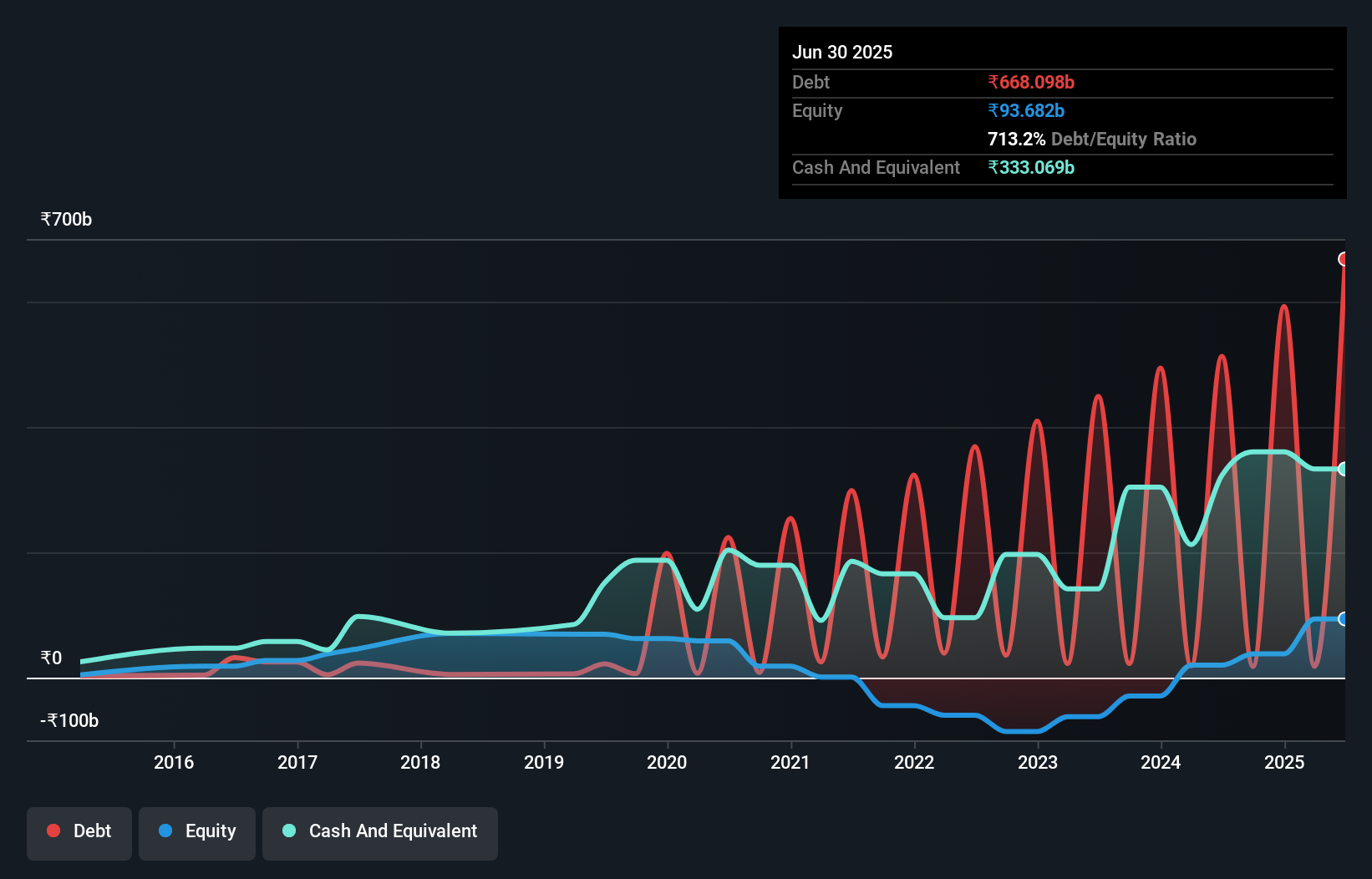InterGlobe Aviation (NSE:INDIGO) Seems To Use Debt Quite Sensibly
Some say volatility, rather than debt, is the best way to think about risk as an investor, but Warren Buffett famously said that 'Volatility is far from synonymous with risk.' So it seems the smart money knows that debt - which is usually involved in bankruptcies - is a very important factor, when you assess how risky a company is. Importantly, InterGlobe Aviation Limited (NSE:INDIGO) does carry debt. But should shareholders be worried about its use of debt?
When Is Debt Dangerous?
Debt assists a business until the business has trouble paying it off, either with new capital or with free cash flow. Ultimately, if the company can't fulfill its legal obligations to repay debt, shareholders could walk away with nothing. However, a more frequent (but still costly) occurrence is where a company must issue shares at bargain-basement prices, permanently diluting shareholders, just to shore up its balance sheet. Of course, plenty of companies use debt to fund growth, without any negative consequences. When we think about a company's use of debt, we first look at cash and debt together.
What Is InterGlobe Aviation's Debt?
The image below, which you can click on for greater detail, shows that at March 2025 InterGlobe Aviation had debt of ₹668.1b, up from ₹512.8b in one year. However, it does have ₹333.1b in cash offsetting this, leading to net debt of about ₹335.0b.

How Healthy Is InterGlobe Aviation's Balance Sheet?
The latest balance sheet data shows that InterGlobe Aviation had liabilities of ₹342.2b due within a year, and liabilities of ₹722.6b falling due after that. Offsetting this, it had ₹333.1b in cash and ₹13.2b in receivables that were due within 12 months. So it has liabilities totalling ₹718.5b more than its cash and near-term receivables, combined.
InterGlobe Aviation has a very large market capitalization of ₹2.20t, so it could very likely raise cash to ameliorate its balance sheet, if the need arose. But it's clear that we should definitely closely examine whether it can manage its debt without dilution.
View our latest analysis for InterGlobe Aviation
We measure a company's debt load relative to its earnings power by looking at its net debt divided by its earnings before interest, tax, depreciation, and amortization (EBITDA) and by calculating how easily its earnings before interest and tax (EBIT) cover its interest expense (interest cover). The advantage of this approach is that we take into account both the absolute quantum of debt (with net debt to EBITDA) and the actual interest expenses associated with that debt (with its interest cover ratio).
InterGlobe Aviation's debt is 3.1 times its EBITDA, and its EBIT cover its interest expense 2.8 times over. Taken together this implies that, while we wouldn't want to see debt levels rise, we think it can handle its current leverage. Notably, InterGlobe Aviation's EBIT was pretty flat over the last year, which isn't ideal given the debt load. The balance sheet is clearly the area to focus on when you are analysing debt. But it is future earnings, more than anything, that will determine InterGlobe Aviation's ability to maintain a healthy balance sheet going forward. So if you're focused on the future you can check out this free report showing analyst profit forecasts.
Finally, while the tax-man may adore accounting profits, lenders only accept cold hard cash. So the logical step is to look at the proportion of that EBIT that is matched by actual free cash flow. Over the last three years, InterGlobe Aviation actually produced more free cash flow than EBIT. There's nothing better than incoming cash when it comes to staying in your lenders' good graces.
Our View
On our analysis InterGlobe Aviation's conversion of EBIT to free cash flow should signal that it won't have too much trouble with its debt. But the other factors we noted above weren't so encouraging. For example, its interest cover makes us a little nervous about its debt. When we consider all the elements mentioned above, it seems to us that InterGlobe Aviation is managing its debt quite well. Having said that, the load is sufficiently heavy that we would recommend any shareholders keep a close eye on it. The balance sheet is clearly the area to focus on when you are analysing debt. However, not all investment risk resides within the balance sheet - far from it. For instance, we've identified 2 warning signs for InterGlobe Aviation (1 is potentially serious) you should be aware of.
When all is said and done, sometimes its easier to focus on companies that don't even need debt. Readers can access a list of growth stocks with zero net debt 100% free, right now.
New: AI Stock Screener & Alerts
Our new AI Stock Screener scans the market every day to uncover opportunities.
• Dividend Powerhouses (3%+ Yield)
• Undervalued Small Caps with Insider Buying
• High growth Tech and AI Companies
Or build your own from over 50 metrics.
Have feedback on this article? Concerned about the content? Get in touch with us directly. Alternatively, email editorial-team (at) simplywallst.com.
This article by Simply Wall St is general in nature. We provide commentary based on historical data and analyst forecasts only using an unbiased methodology and our articles are not intended to be financial advice. It does not constitute a recommendation to buy or sell any stock, and does not take account of your objectives, or your financial situation. We aim to bring you long-term focused analysis driven by fundamental data. Note that our analysis may not factor in the latest price-sensitive company announcements or qualitative material. Simply Wall St has no position in any stocks mentioned.
About NSEI:INDIGO
InterGlobe Aviation
Provides air transportation services under the IndiGo brand in India and internationally.
High growth potential with adequate balance sheet.
Similar Companies
Market Insights
Community Narratives



